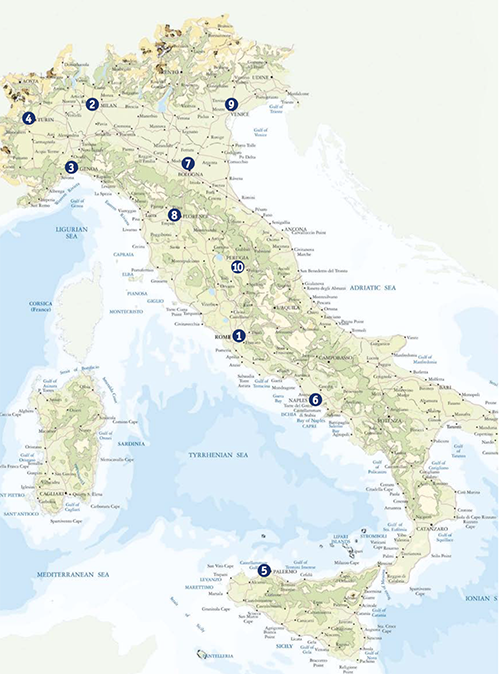Incase you can’t decide on your ideal Italian city to settle in – we have made a list of the top cities for you to make the choice a bit clearer.

1. Rome – population 2,850,000
Italy’s brash, loud, vibrant capital is a confident, thick-skinned place, secure in its achievements and completely unsurprised to receive 12 million visitors a year. For all Rome’s expense and congestion, a high proportion of ex-pats who settle down here ‘for a while’ never go home again. Property prices are, as you would expect, very high. Apartments range from €2,500-€5,000 per sqm, with one-bedroom places asking about €300,000 on average; two-beds about €400,000. Holiday rental prospects are excellent, as are long-term lets to students or professionals.
2. Milan – population 1,300,000
Milan is Italy’s wealthiest and probably best-dressed city. The capital of finance, fashion, design and media, this is a business-minded metropolis driven by cool-headed workaholics in razor-sharp suits. Sleek, fast-paced Milan might not be physically beautiful (beyond its dazzling duomo), but it offers comfort and quality at every turn. Shopping, nightlife and the arts scene are world-class, and the lovely northern lakes aren’t too far away. Milan’s property is pricey, with one-bed apartments asking €200,000, and two-beds about €320,000. Lots of old palazzi in the city have recently been converted into stylish flats.
3. Genoa – population 600,000
Zesty, colourful Genoa has thrived on seaborne trade for 1,500 years and is Italy’s second largest port. Eclectic in food and architecture, this cosmopolitan city stretches for miles along its cluttered shoreline, with the mouth-watering resorts of coastal Liguria never too far away. For property, Genoa can be one of the cheapest spots in Liguria, with larger properties offering particularly good value. One-bedroom apartments ask about €150,000 on average; two-beds about €230,000. Buyers might consider long-term tenants, as well as the modest holiday rental market here.
4 .Turin – population 900,000
Enjoying relatively fresh urban air at the foot of the Alps, industrious Turin has elegant boulevards, baroque palaces, sleek boutiques and French cuisine. It’s an appealing and underrated place, with a lively café scene and access to great skiing. The outskirts are dominated by characterless apartment blocks, but the centre is attractive. Property prices are reasonable. One-bed apartments go for €120,000 on average; two-beds about €200,000. Long-term rentals to southern Italian migrant workers or students are a better bet than short-term lets to tourists.
5. Palermo – population 675,000
Noisy, bustling Palermo is Sicily’s capital and the island’s biggest city, superbly set on a wide bay. Formerly notorious as a Mafia stronghold, it’s a much improved and revitalised place these days. The city’s architecture is full of exotic elements from all over the Mediterranean and beyond – testament to Sicily’s colourful past – and there are lots of attractive old properties to be restored. Government grants can cover your restoration costs, but applications can take years to be approved. Apartments are inexpensive, starting at about €1,000 per sqm and rarely going above €2,500 per sqm. One-beds ask less than €100,000.
6. Naples – population 1,000,000
Naples is an exuberant city. Its cheerful, free-spirited populace smiles in the face of poverty and laughs at the rules of the road. Ex-pats generally steer clear of Naples, fearing its petty crime and traffic chaos. But it’s an intensely colourful spot, and handily close to Capri and the Amalfi Coast. The food is glorious and the cost of living low. Lots of people want to live here, and property is more expensive than you might expect. One-bedroom apartments in nice areas ask around €190,000 on average, two-beds about €260,000. Investors should consider long-term lets to locals.
7. Bologna – population 390,00
Inexplicably overlooked by foreign tourists, Bologna, the ‘Red City’, is a lively and prosperous city with strong links to a communist past and a striking red-brick medieval centre (from which it gets its nickname). Home to Italy’s best restaurants and Europe’s oldest university, Bologna is genial, cultured, well-paced and easy-going. It offers a very high quality of life, but living costs can be substantial. Property prices have risen steadily, and the city is considered a good investment. Long-term rental prospects from students are very good. One-bedroom apartments ask about €170,000 on average, with two-beds about €250,000.
8. Florence – population 385,000
Stuffed full of exquisite paintings, sculptures and churches, Florence is a magnet for lovers of Renaissance art and architecture. The British have long adored this capital of Tuscany, and there’s no shortage of them here, along with other ex-pats. Property prices in Florence are high, but the city is still considered a good investment. Tourists visit at all times of the year, and there are also innumerable students to rent to. A one-bed apartment might ask €230,000; a two-bed €350,000. For all its loveliness, note that Florence can be crowded and traffic-choked.
9. Venice – population 270,000
Often deemed the world’s most romantic city, Venice is a uniquely beautiful place that never leaves you once you’ve visited. Crumbling, flood-prone and difficult to live in, it nonetheless draws thousands of rapturous ex-pats and millions of dazzled visitors every year. Property prices are sky-high, but holiday rental prospects superb. Prices are astronomical on the Grand Canal, and lowest near the train and bus stations, in Cannaregio, and in other less-touristy areas. Lovely old buildings are generally high-maintenance and prone to damp. Expect most one-bed apartments to ask at least €300,000.
10. Perugia – population 170,00
Umbria’s bewitching capital city is a small place – befitting this region of tiny settlements filled to the brim with history and elegant architecture. Population-wise, Perugia is only Italy’s 24th-biggest city, but it deserves inclusion here because it offers such good investment opportunities. It’s not overpriced, it has lots of tourists, lots of students – both giving good rental prospects – and it gives easy access to glorious surrounding countryside (where property is more expensive than in the city itself). One-beds average around €100,000, two-beds €180,000.
